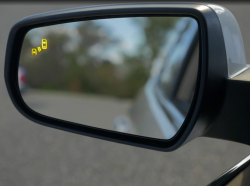— A GM side blind zone alert lawsuit should allegedly be dismissed because the plaintiff's claims about 2013-2018 Chevy Cruze cars are allegedly not based on the facts. That opinion is held by General Motors as the automaker filed a motion to dismiss the class-action.
Anthony and Lisa Hudson say they purchased a 2013 Chevy Cruze in September 2013, a car equipped with the optional “Enhanced Safety Package” which included the system that illuminates an amber display in the side mirrors if it detects vehicles in the “blind spots” of the side mirrors.
The plaintiffs allege in May 2015, the General Motors side blind zone alert system “malfunctioned” and was repaired under warranty by a GM dealer. But the plaintiffs claim the system malfunctioned again after the warranty expired, causing problems to unspecified electrical systems.
The lawsuit alleges it can cost $1,000 to repair the system, but the lawsuit doesn't allege the plaintiffs paid that amount for repairs.
According to the lawsuit, there are problems with the sensors because they are located on the rear bumper where the sensors can be affected by water, rain, snow and dirt.
Attorneys for GM tore into the alleged arguments made by the plaintiffs and told the judge the case should immediately be dismissed.
GM points out the lawsuit alleges more than 1.1 million 2013-2018 Chevy Cruze cars were sold and about 25 percent were equipped with the alert systems. This means the plaintiffs claim more than 250,000 cars in the U.S. have defective alert systems, yet the lawsuit mentions only 40 cars that were presented for service of the systems during the warranty periods.
In addition, GM argues the plaintiffs don't allege any specific facts about those 40 Cruze cars, such as the problems experienced or details about the repairs.
Saying the nationwide class-action lawsuit gives the term “threadbare” new meaning, attorneys for GM told the judge that 40 cars needing repairs out of more than 250,000 over the course of five years doesn't mean the side blind zone alert systems are defective.
According to GM, the plaintiffs sued because their car was repaired once for free under warranty, and apparently the car owners want "limited" warranties to last forever.
"GM provides a limited warranty, not a lifetime guarantee. Two repairs after several years of vehicle use does not come close to supporting their individual claims, much less a costly and time-consuming class action."
In its motion to dismiss the lawsuit, GM says the plaintiffs allege “the problem with the sensors is inherent in the design of the vehicle.” But the automaker argues the express terms of GM’s limited warranty only applies to defects caused by “materials or workmanship,” not to the alleged side blind zone alert design defect.
The automaker also told the judge no breach of warranty violations occurred because the plaintiff's alert system was repaired for free under the warranty. The plaintiffs never claim they took their vehicle back to the dealer and asked for another repair under warranty. But GM argues even if they had and GM denied the request, the automaker would still be in the clear.
Attorneys for GM note that "nothing in the warranty guarantees that a part repaired during the warranty period will never again require repair, nor does the law impose such an obligation upon a manufacturer. To do so would be tantamount to re-writing the terms of the limited warranty into one of unlimited scope and duration."
Furthermore, the automaker says even if the system malfunctioned a second time does not mean the first repair was not “effective,” as the plaintiffs contend. And GM's lawyers told the judge the lawsuit doesn't allege the alert system was nonfunctional when the Cruze was sold or at any time prior to 2015.
As part of the lawsuit, the Cruze owners claim GM had knowledge of the alleged defects because of warranty claims and customer complaints, but GM argues the plaintiffs have no sound argument. While the plaintiffs reference internet complaints, GM says the plaintiffs do not name a single complaint made before they purchased their Cruze in September 2013.
In addition, GM says numerous courts have ruled random postings online do not mean a manufacturer has advance knowledge of possible problems. GM argues if that was the case, then “[a]ll any plaintiff would be required to show is that a product broke once and that someone complained about it on the internet.”
And finally, General Motors says warranty and fraud claims based on a nationwide class-action should be dismissed because the "variations in state laws would preclude class certification."
The GM side blind zone alert lawsuit was filed in the U.S. District Court for the Eastern District of Michigan, Southern Division - Anthony and Lisa Hudson, et al., vs. General Motors LLC.
The plaintiffs are represented by Romano Law PLLC, Frank Melchiore, and Edelman, Combs, Latturner & Goodwin, LLC.

